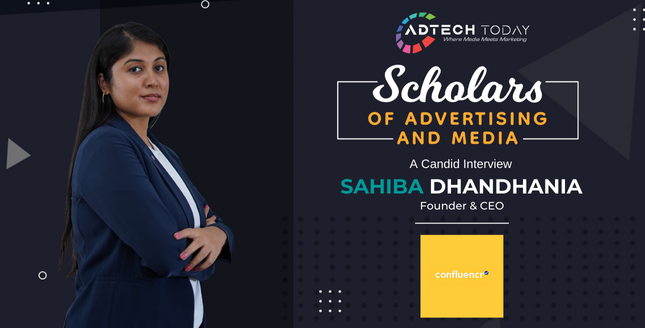

Sahiba Dhandhania, Founder & CEO, Confluencr, is a trailblazing entrepreneur and influencer marketing leader who thrives at the intersection of data, creativity, and human connection. From her early experiences in finance and edtech to building Confluencr into one of India’s top influencer marketing agencies, Sahiba has consistently turned curiosity and insight into impact. Under her leadership, Confluencr operates across 10+ countries, delivering large-scale, award-winning campaigns while championing authenticity and trust. Known for her deep understanding of creator culture and audience behavior, she empowers brands and creators alike to tell stories that resonate and drive meaningful results.
From hedge funds to edtech and now influencer marketing, your journey has spanned very different industries. What inspired these shifts, and how have they shaped the way you build and lead Confluencr today?
Honestly, it’s always been curiosity that’s guided me. Finance taught me discipline, numbers don’t lie, and data is power. Edtech showed me how technology can democratize and change lives. Influencer marketing became the place where both collide: powered by data, but thriving on human connection. Moving across such different worlds taught me to stay comfortable with change and to always chase impact. That’s why Confluencr feels like me in business form, analytical at its core, yet deeply human in its voice.
Confluencr today works with over 10 countries and has been recognised as India’s Best Large Influencer Marketing Agency. What do you see as the key drivers behind this rapid growth?
One word: trust. Creators trust us to treat them as true partners, brands trust us to deliver authentic stories, and within our team, we trust each other to keep pushing boundaries. We built Confluencr on systems and scalability where every campaign can run like clockwork, even at massive scale. Add to that our obsession with understanding how audiences behave online, and the ability to balance global reach with local nuance, that’s been a game-changer. But the real fuel is our people. Their energy, their experiments, their resilience. That’s been our unfair advantage.
The Flipkart GlamUp Fest brought together 2,500+ creators for a single campaign — a massive feat in scale and execution. What were some of the most rewarding takeaways from leading this initiative?
The GlamUp Fest proved one thing: when scale meets creativity, it’s pure magic. Thousands of creators, each with a unique voice, came together under one umbrella without losing authenticity—and that was gold. What made it truly special wasn’t the numbers on paper but the grit behind the scenes. Our office practically lived and breathed Flipkart during those weeks. Late nights blurred into mornings, no one remembered what day it was, yet the energy never dipped.
For me, the most rewarding part was watching the team push beyond their own definition of “good.” It wasn’t just about pulling off a big campaign—it was about discovering how much further we can stretch, how much higher we can scale, and what we’re truly capable of as a company. Seeing ops, tech, and creator relationships fire at that scale with such precision gave me goosebumps. It reaffirmed what I’ve always believed: when vision meets execution, there are no limits.
Influencer marketing is often debated as a trend versus a long-term shift. From your vantage point, how is the space evolving, and what excites you most about its future?
It’s not a trend. It’s the pillar. Brands today can’t rely on polished ads alone. Consumers crave authenticity, and creators bridge that gap beautifully. What excites me most is that we’re just scratching the surface. With AI, sharper analytics, and new platforms emerging, creators will get richer ways to express themselves, and brands will measure impact better than ever. And here’s my bet: the future belongs to micro and nano creators. Because in this game, what works is trust over follower count.
Having worked across finance, edtech, content, and now marketing, how has your leadership style evolved through these transitions?
In my early years, I leaned hard on structure… frameworks, numbers, processes. But leadership isn’t just Excel sheets, it’s empathy, adaptability, and giving people space to be their full selves. Finance taught me precision. Edtech taught me empathy for the end-user. Content taught me creativity. And marketing demands all three. Today, I lead less by instructing and more by enabling by setting vision, building systems, and then letting my team innovate boldly. From managing → to truly leading.
As a woman entrepreneur shaping conversations in digital, what advice would you give to aspiring women leaders who want to make their mark in marketing and beyond?
First, know this: your perspective is valuable. Don’t hesitate to take up space… diverse voices aren’t a nice-to-have, they’re exactly what business needs. Second, build your tribe, mentors, peers, and collaborators who lift you and challenge you. Third, don’t shy away from risk. My boldest moves were the least linear, but they shaped me the most. And finally, carry your authenticity like a superpower. In a world chasing trends, being yourself is the sharpest differentiator you’ll ever have.